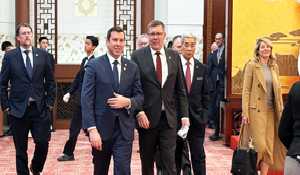Kipling, Grenfell receive traffic safety money - Fund delivers $1.54 million in grants across province
July 21, 2025, 12:16 pm
Ryan Kiedrowski, Local Journalism Initiative Reporter

There will be new signage popping up across Saskatchewan over the summer as the provincial Traffic Safety Fund announced $1.54 million in funding to 62 new projects. The fund awards grants of up to $100,000 twice per year with a goal of reducing collisions and traffic fatalities across the province.
“The Government of Saskatchewan and SGI are committed to delivering safer roads for everyone in Saskatchewan,” said the Minister Responsible for SGI, Jeremy Harrison. “This $1.5 million in provincial grants will enable 61 municipalities and First Nations throughout our province to deliver enhancements to traffic safety in their communities.”
Locally, the communities of Kipling and Grenfell were recipients of funding for their safety initiatives.
Kipling received $5,622 for their project Stop in the Name of Safety, which will see stop signs installed in three locations—Main Street and Hebden Road, Grid Road 605 and Railway Street, and Highway 48 and Sixth Avenue.
“They’re bigger stop signs, and then they have the LED lights around them, so they flash at you and they’re solar,” described Brenna Ackerman, CAO with the Town of Kipling. “They’re really bright!”
Once it was learned they were approved for the funding, the signs were ordered with town staff installing them upon arrival.
“We have quite a few of the speed signs, but I think these ones will be good because it grabs your attention differently,” Ackerman said.
In Grenfell, the Keeping our Pedestrians Safe project received $23,269 in funding for signage at a pair of crosswalks.
“We wanted to make sure that the kids had a safe route to get across the street, especially coming over to the school, with the schools being in the south side of the town,” explained Town of Grenfell Office Clerk Jenna Parker.
“We also installed a crosswalk over at our Grenfell Recreational Park area since we are trying to make that kind of a recreation hub for Grenfell.”
Signage at the two crosswalks are also solar powered, and an audible ‘beep’ can be heard when activated.
Over 900 projects funded to date
The Traffic Safety Fund began in 2019 through SGI, using funds from photo speed enforcement tickets. In that time, a total of $14.55 million has been distributed to 918 projects across the province. This year alone saw 62 projects in 61 communities, ranging from villages, towns, cities, resort villages, rural municipalities, northern villages, and First Nations.
To be eligible, projects must address one or more priorities of speeding, impaired driving, distracted driving, occupant protection, intersection safety, aggressive driving, vulnerable road users, or medically-at-risk drivers.
With the most recent round of funding awarded on June 30, the second round of applications is now open (effective July 1), with a closing date of Sept. 30. Applications from across the province go to a committee comprised of representatives from Saskatchewan Urban Municipalities Association, Saskatchewan Association of Rural Municipalities, the Prince Albert Grand Council, the Saskatchewan Association of Chiefs of Police, the Ministry of Justice, the Ministry of Highways, and SGI.
Successful applicants in this second round of funding will be awarded on Dec. 30, 2025.



































